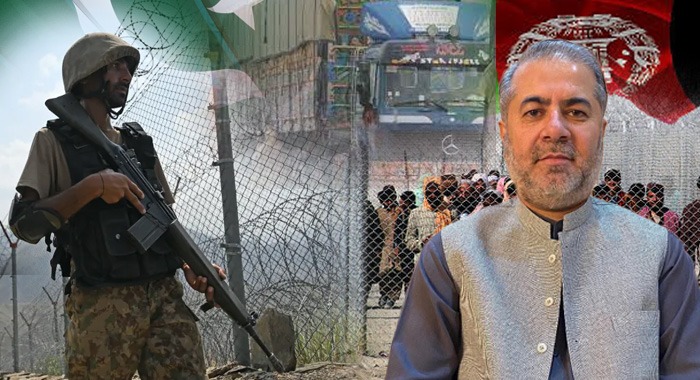Mushtaq Yusufzai
The drone attack in Pakistan’s Panjgur district—allegedly launched from Afghan territory—has reignited a familiar anxiety in Islamabad: is the Afghan Taliban aligning more closely with India? While this question may seem speculative at first glance, several recent developments demand serious scrutiny.
Historically, Afghanistan and India have maintained a warm relationship. Even during the early years of Pakistan’s formation, Afghanistan stood apart as the only country to oppose its entry into the United Nations. The two nations do not share a direct border, yet their diplomatic ties have often overshadowed those between Kabul and Islamabad. In contrast, Pakistan has hosted millions of Afghan refugees for decades, educated generations of Afghans, and extended extensive support—military, humanitarian, and political—to Afghanistan throughout multiple conflicts.
Given this history, the Taliban’s apparent tilt toward India is both puzzling and concerning. Since the group’s return to power in 2021, Pakistan had expected an era of cooperation, assuming that the shared past and deep-rooted connections would translate into strategic alignment. Many Taliban officials spent years in Pakistan, studied in its seminaries and universities, and even operated from its soil during the insurgency. Yet, despite these ties, Afghanistan under the Taliban remains unwilling to cater to Pakistan’s expectations.
Recent reports—though unconfirmed—about visits by senior Taliban figures to India and secret meetings with Indian officials have only deepened these concerns. Some suggested that a top-level Taliban leader, such as Ibrahim Sadr, had traveled to India. However, this appears implausible. Figures like Sadr are ideologically rigid and do not generally engage in formal diplomacy with foreign states. High-level interactions between the Taliban and countries like India, if they occur at all, are usually discreet and conducted through intelligence channels—not public or official visits.
The drone strike on Panjgur, which utilized what is believed to be Israeli technology, has fueled speculation about a broader regional alignment involving Afghanistan, India, and even Israel—particularly among those hostile to Pakistan. The attack’s alleged origin from Afghan soil is troubling, especially as it coincides with increasingly hostile narratives against Pakistan emanating from Afghan social media circles. These reactions revealed a segment of Afghan society openly celebrating the attack, with some users referring to it as long-awaited revenge. Others attempted to draw a line between Pakistan’s establishment and its people, blaming only the former for Afghanistan’s misfortunes.
This bitterness is not new. Afghans have frequently accused Pakistan of interfering in their internal affairs and undermining peace. But this narrative ignores the complex realities. Pakistan’s sacrifices—hosting over three million refugees for decades, providing education, health services, and shelter—have never been fully acknowledged. Ironically, many Taliban ministers and ambassadors today are products of Pakistani institutions, while India—where almost no Taliban members studied—has managed to build new bridges in Kabul.
India was initially uneasy about the Taliban’s return to power, fearing the group was merely a Pakistani proxy. Yet, New Delhi acted swiftly to regain its foothold. It reopened its embassy, resumed stalled development projects, and sent envoys for quiet engagement. This approach, focused on pragmatism rather than ideology, seems to be yielding dividends. Pakistan, on the other hand, may have miscalculated by assuming that its past patronage would automatically guarantee loyalty.
At the heart of this miscalculation lies a misunderstanding of Afghan nationalism. Whether under Mullah Omar, Hamid Karzai, Ashraf Ghani, or the current Taliban leadership, Afghan rulers have consistently resisted external pressure—especially from neighbors. They have repeatedly refused to recognize the Durand Line as an international border, despite Pakistani expectations. The Taliban, like their predecessors, place Afghan sovereignty above all and do not appreciate being dictated to, even by friendly states.
That said, it would be simplistic to suggest that the Taliban are pivoting entirely toward India. Within their ranks, there are diverse perspectives. While some factions maintain a hardline stance toward Pakistan, others have clearly articulated a more balanced position. The current Interior Minister, Sirajuddin Haqqani, has publicly opposed using Afghan territory to attack Pakistan. Several Taliban factions have even expressed willingness to mediate or assist in resolving the tensions between Pakistan and the Tehreek-e-Taliban Pakistan (TTP), emphasizing their desire for peace and neutrality.
The Panjgur incident, while alarming, may not signify a permanent policy shift. It does, however, highlight the fragile state of relations between two neighbors bound by geography, religion, and decades of shared history. In moments of crisis, true alliances—or their absence—are revealed. Unfortunately, despite its unwavering support during the most difficult years of the Taliban’s struggle, Pakistan finds itself vilified in Afghan discourse. India, by contrast, is increasingly seen as a reliable partner in Kabul’s corridors of power.
This paradox underscores the need for introspection in Islamabad. Emotional appeals to brotherhood and past sacrifices are not enough to shape foreign policy. What is required is a strategic reset—one that acknowledges Afghan sovereignty, engages diplomatically without imposing expectations, and builds mutual respect through dialogue rather than assumption.
Afghanistan under the Taliban may not be a Pakistani proxy—but neither is it bound to India. It is, above all, an independent, fiercely nationalist state. If Pakistan hopes to maintain meaningful ties with Kabul, it must engage with Afghanistan as a sovereign equal, not a junior partner. Only then can trust be rebuilt, and the region’s delicate balance be preserved.





